MIPIM Day Two Roundup Wednesday 13 March
Read a round up of all of the panel discussions and sessions from Manchester's second day at MIPIM 2024 under the theme Investing in Success.
Wednesday 13 March market day two of the Manchester Invest Partnership’s time at MIPIM 2024, with another day full of sessions to discuss how Greater Manchester can build on past success to achieve future growth which is inclusive and benefits the entire population.
Day two’s programme featured discussions around sustainability, innovation and driving growth in specific areas of the city-region, with a range of partners and speakers sharing their insights.
The first panel of the day focused on Trafford Park’s vision for a cleaner, more sustainable future in “Greening the World’s First Industrial Estate.” Speakers on this session included Jane Healey Brown
Director, Global Town Planning & Policy Skills Leader at Arup, Philip Lunn Managing Director of Pradera Lateral, Richard Roe Corporate Director of Place at Trafford Council and moderator Andrew McIntosh Director of Place at Greater Manchester Combined Authority.
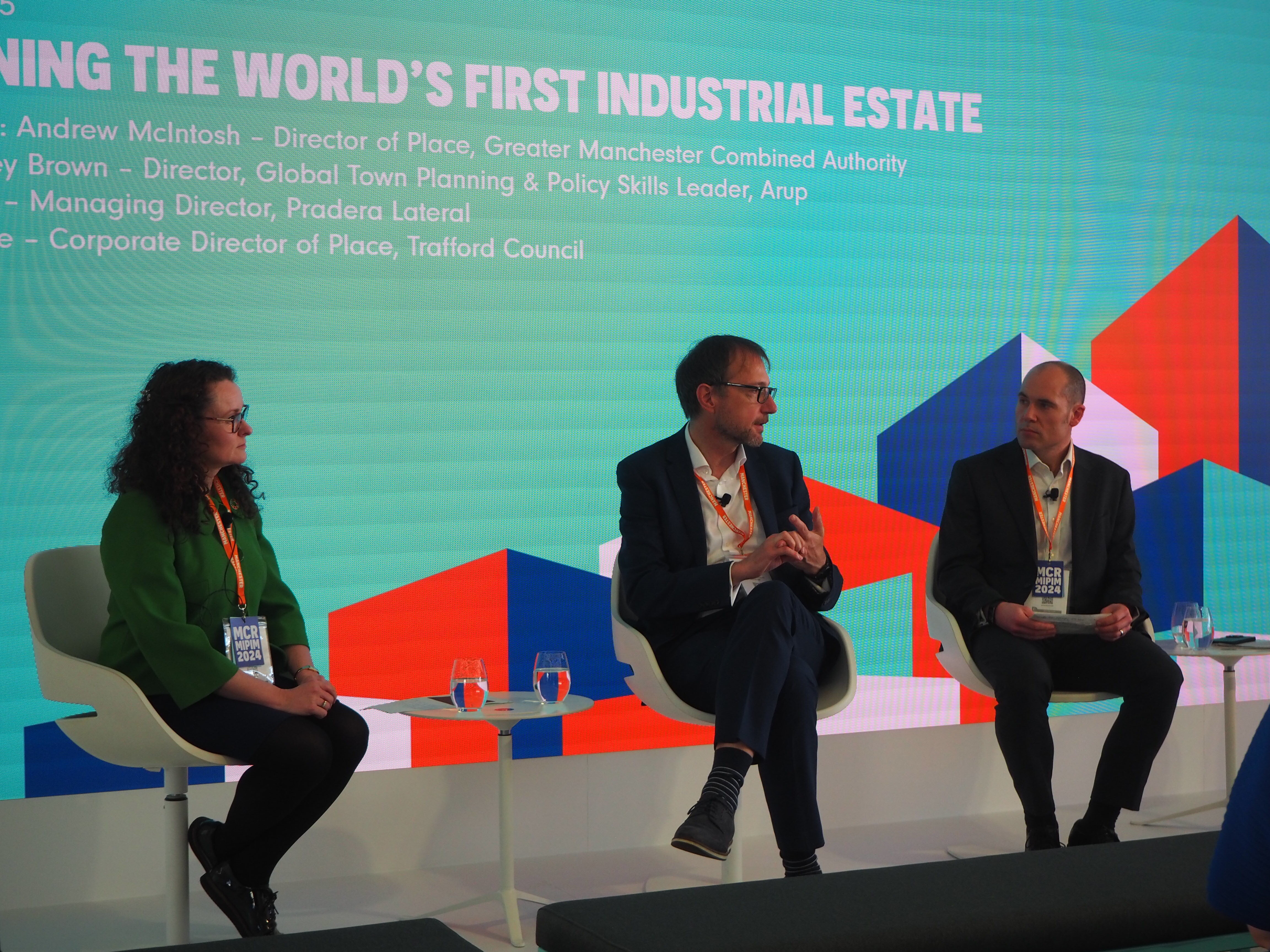
The panel discussed the ambitious, shared vision for a low-carbon future for Trafford Park and Trafford City including new energy sources and green infrastructure which will change the face of the industrial estate. Representatives from Arup and the Trafford Centre discussed the challenges and potential solutions of greening both industry and commerce at scale.
Jane Healey Brown said “We often think about Greening, retrofit and active travel agenda in residential settings and city centres but we have a real opportunity with Trafford Park. We have a real opportunity to do something different and have a real impact. We now need to look at it holistically and see how we can take those learnings and apply them to other business parks."
Philip Lunn Managing said “Trafford has really been the vanguard of the transition to EVs. The concentration of 60 ultra rapid chargers will be the largest concentration of ultra-rapid chargers in remote.
"There is much more we can do, Metrolink has had a huge impact for us but we’re on the front foot. For us, in terms of travel planning, staff planning and encouraging the transition to EV, we’re doing everything we can as a centre.
"The good thing about Trafford's industrial heritage is that there’s still a lot of power in the grid. The infrastructure is there and will allow us to be pioneers"
Richard Roe said “Trafford Park is the world’s first industrial estate but it still a key economic driver to this day. It needs to adapt to change. But it has to be a leader of that change like it's been a leader of Industrial change.
"Trafford Park is absolutely key to addressing the councils climate challenge, nearly half of the boroughs emissions come from Trafford Park."
Andrew McIntosh said “Trafford Park is a site with a lot of heritage and history. As a commercial site, Trafford Park has loads of roofs we can put solar PV on, lots of potential heat networks. Alongside that how can we make it a green development and use green infrastructure.
"We have great support in GM through the likes of the Growth Company and the devolution deal will give us a real opportunity to deliver.”
Then it was time to discuss Greater Manchester’s strengths in science and technology in ‘Accommodating the Next Wave of Innovation’.
Sam Darby Development Director, Bruntwood SciTech, Joe Manning Managing Director, MIDAS and Joanne Roney CBE Chief Executive, Manchester City Council joined the panel which was chaired by Mike Emmerich Founding Director, Metro Dynamics.
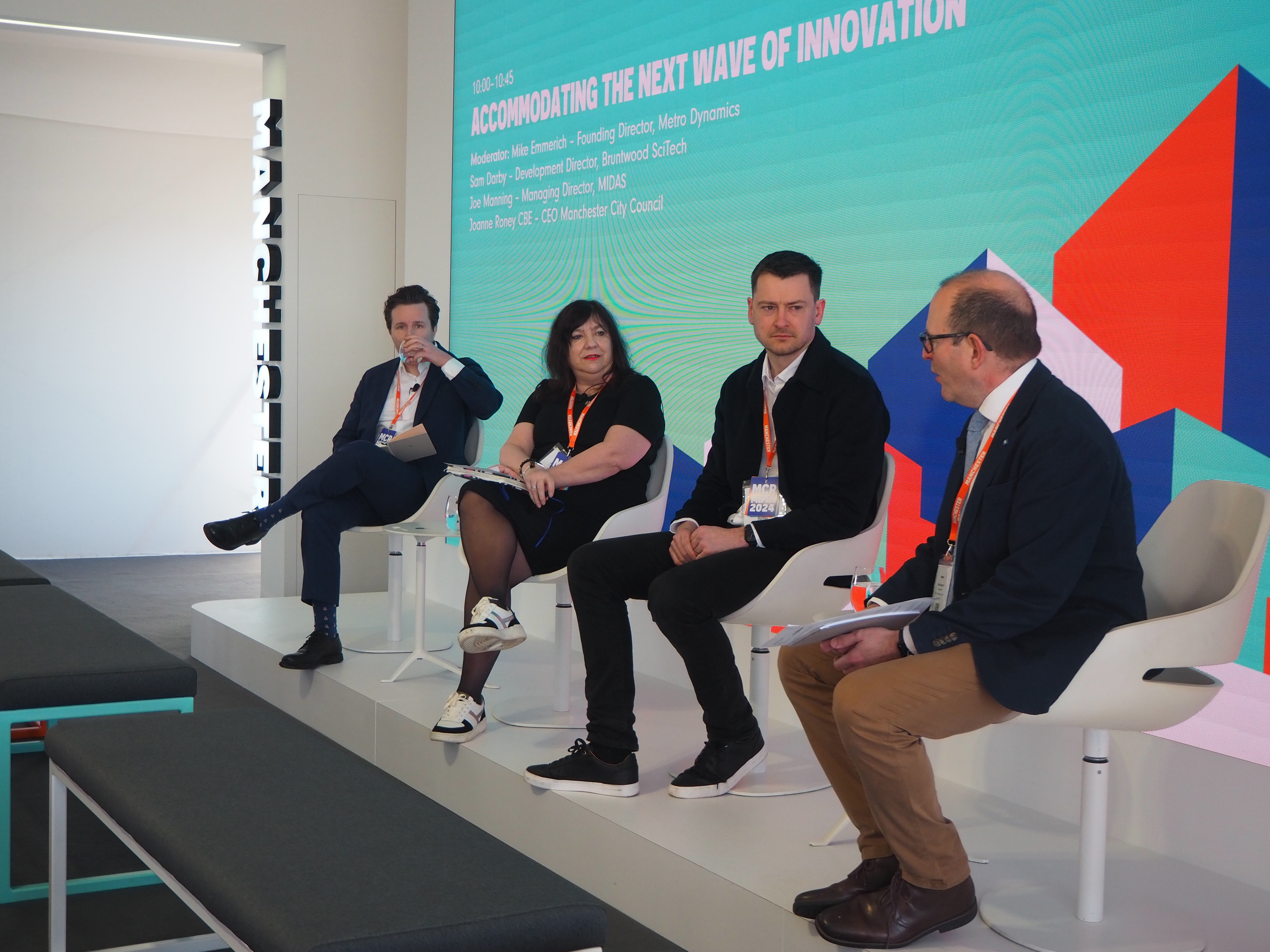
The panel discussed Manchester’s successful pioneering of ‘the cluster effect’ in areas such as the Oxford Road Corridor which created a centre for tech, data and science. They then went on to discuss the new innovation district ID Manchester and what it will mean for Manchester in terms of jobs, academic collaborations and forging innovation-links both across the UK and internationally.
Sam Darby said "For us, its about how we create space that leads to early innovation and gives businesses a head start. We need to give them a space that works with the city to help them grow so they want to stay.
"We have to make sure these districts also attract communities and the public realm works for them, so it doesn’t feel like a city turning its back on them. If we are going to deliver innovation districts in Manchester we need to make sure they’re included.
"ID Manchester will be an eclectic mix of different uses and will be an ecosystem for the city. This is about getting early stage start-ups”
Joe Manning said “In terms of our future growth, if you can get the right mix of public and private investment then you can really scale up the jobs and GVA in the city region, so it’s worth emphasising the size of the prize.
"Businesses want to access the cool kit. They want to be in close proximity to the Graphene Institute so they can work with world leading universities and the world’s best kit. We also see businesses who want to be on the Oxford Road corridor to access talent.
"It's important to say that Greater Manchester is a demonstrator of technologies and an adapter as well, that’s really attractive to businesses looking to come to the region."
Joanne Roney said “Graphene became a real catalyst in terms of what Manchester can be known for in research, development and innovation.
"We’re good at having plans and strategies that hind us all together in GM. When we looked at where to put our innovation zone, it was pretty clear by looking at our existing strengths. This will become a self fulfilling growth prophecy around GM around innovation. You have to trust the maturity of partnerships and strength of leadership to make it a success.”
Next on the Manchester stand, key developers and private sector partners from across Manchester joined “Why We Do Business in Manchester” sharing their reasons for choosing the city and the key opportunities that they believe will help the city to continue its growth journey.
The panel included Phil Marsden Managing Director North West at Muse, Audrey Peers Head of Business Development and Strategic Partnerships at MIDAS, Victoria Quinlan President Europe at Cortland and Daren Whitaker Founder and Chairman of Renaker. The moderator for this session was Liz Hamson, Editor in Chief of BE News.
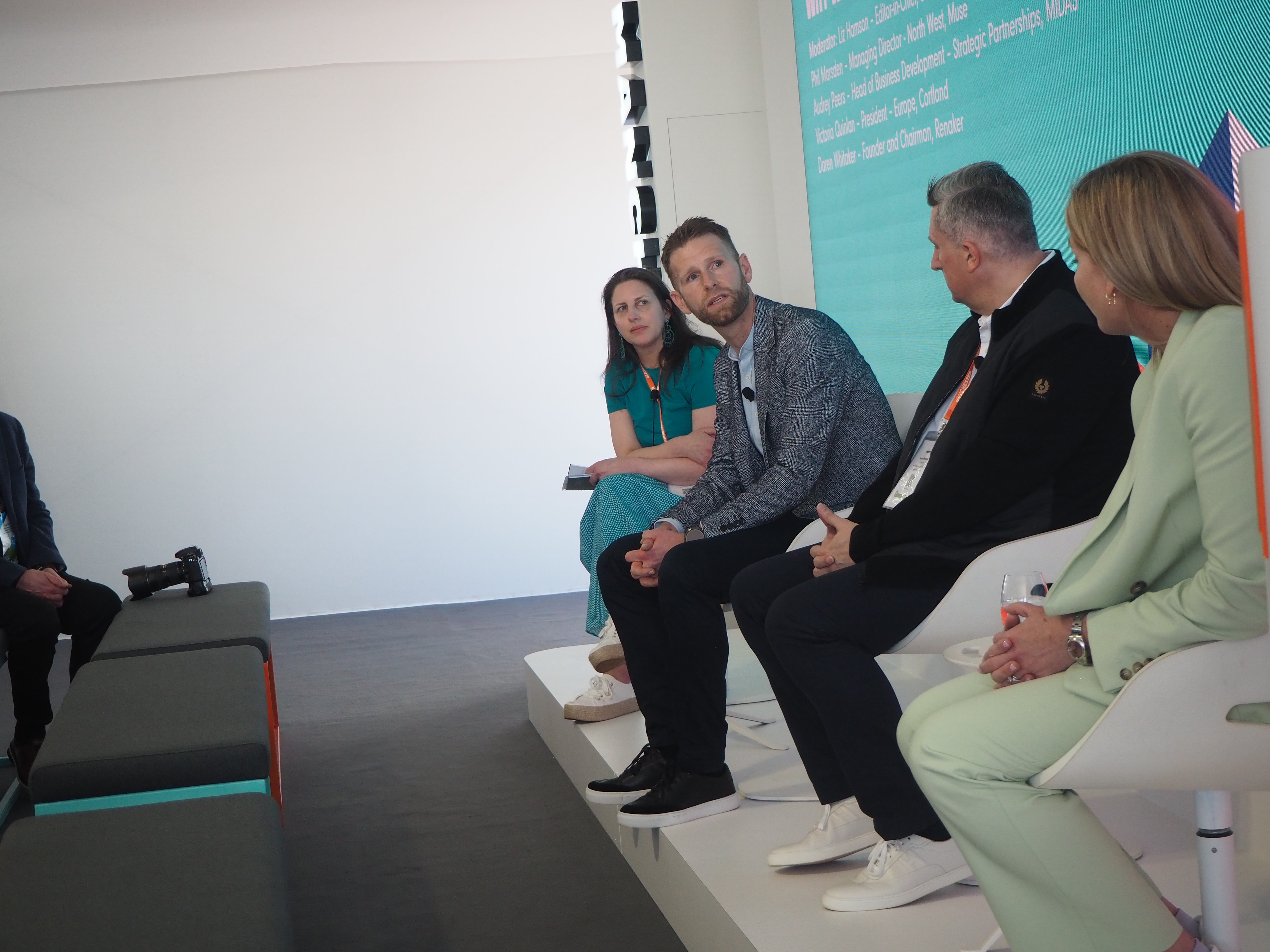
Phil Marsden said “Manchester delivers. When we’re working in Manchester we have certainty things will get done and that’s absolutely invaluable. You can see how clear and how strong that vision is in Manchester and Greater Manchester and that’s really exciting.
"Chanel came to Manchester last year because it's the coolest city in the world. For me, it's just that, it's the coolest city in the world.”
Audrey Peers said “The main criteria for businesses when they look at where to locate in the UK or globally is talent, and Manchester is very very good for that. It has a highly skilled workforce and Manchester and the city region are doing a lot of good work setting up that talent pipeline.
"From a business perspective, they want to be in exciting thriving districts. They want to have the offices, the amenities and the residential for their employees. The office needs to be an extension of their brand, the office sits within a district which sits within Manchester and that’s part of their brand profile.”
Victoria Quinlan said “Manchester is a liveable city and there’s a definite vibe about the city. I think the time and effort that has been put into the long term strategy to get it where it is today, make it more attractive than others, cities don’t just change over night.
If you’re moving from a different country, moving into the city centre with a ready-made community is a really big plus. That optionally is providing a lot more choice for people now.”
Daren Whitaker said “You shouldn’t underestimate the strength of Manchester and the unique environment we have it's a shining light in the UK in terms of certainty, stability and demand.
It’s great that we're looking at new districts like Wythenshawe as it shows we’re looking to the future but what I would say is, don’t forget about the city core, that's not done and there is lots of brownfield regeneration taking place in the city core.”
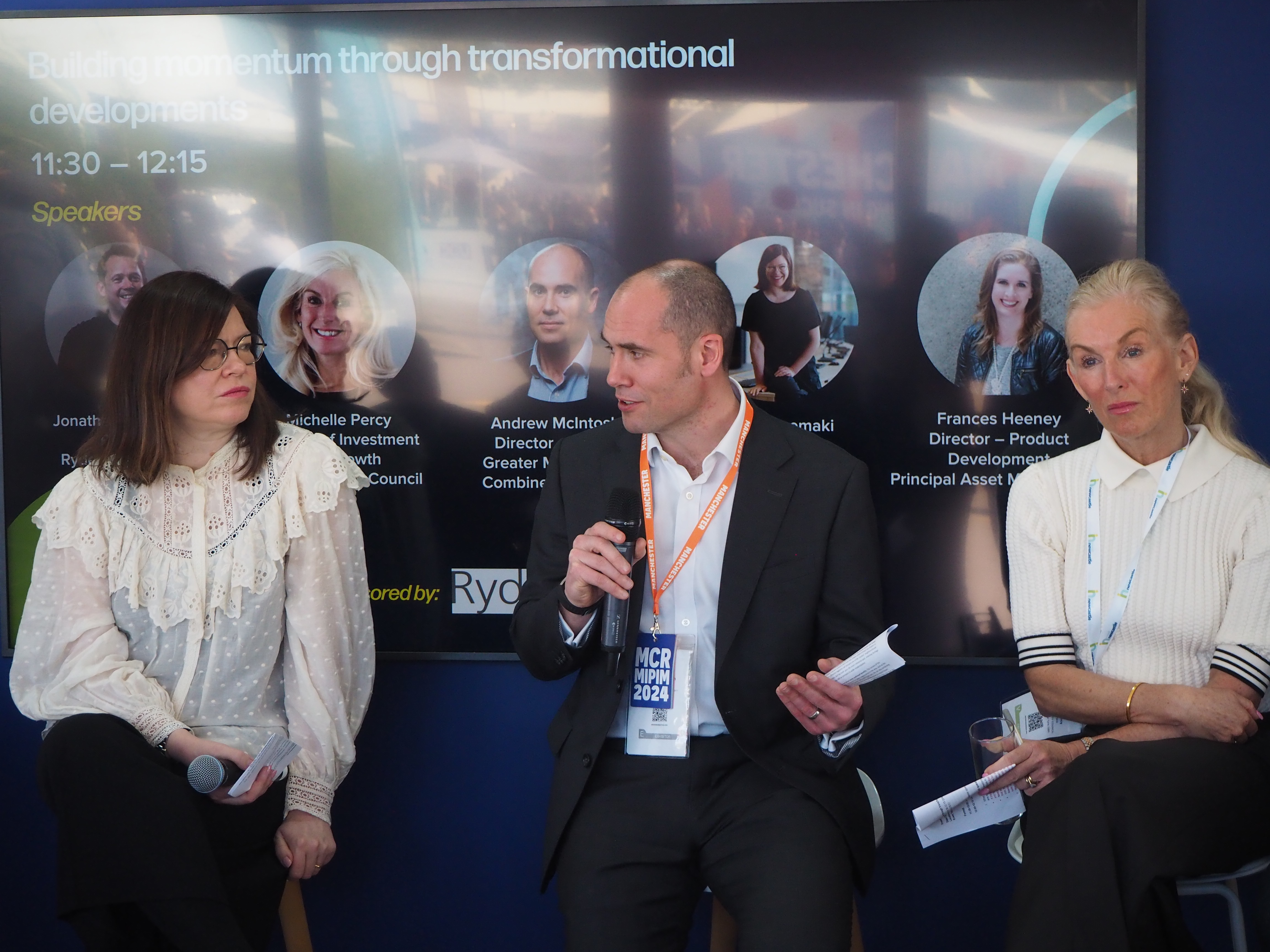
Over on the Newcastle Stand, Andrew McIntosh Director of Place at Greater Manchester Combined Authority joined the panel "Building momentum through transformational developments" with Jonathan Seebacher Parter at Ryder Architecture, Michelle Percy Director of Place at Newcastle City Council, Anni Sinnemaki Deputy Mayor of Helsinki and Frances Heeney Principal at Asset Management.
The panel aimed to take insights from key cities, including Manchester, about how they can ensure development and transformation are aligned with the city’s overall vision, the strength of public and private sector partnerships and how to create international brands that help a city to become globally recognised areas of investment.
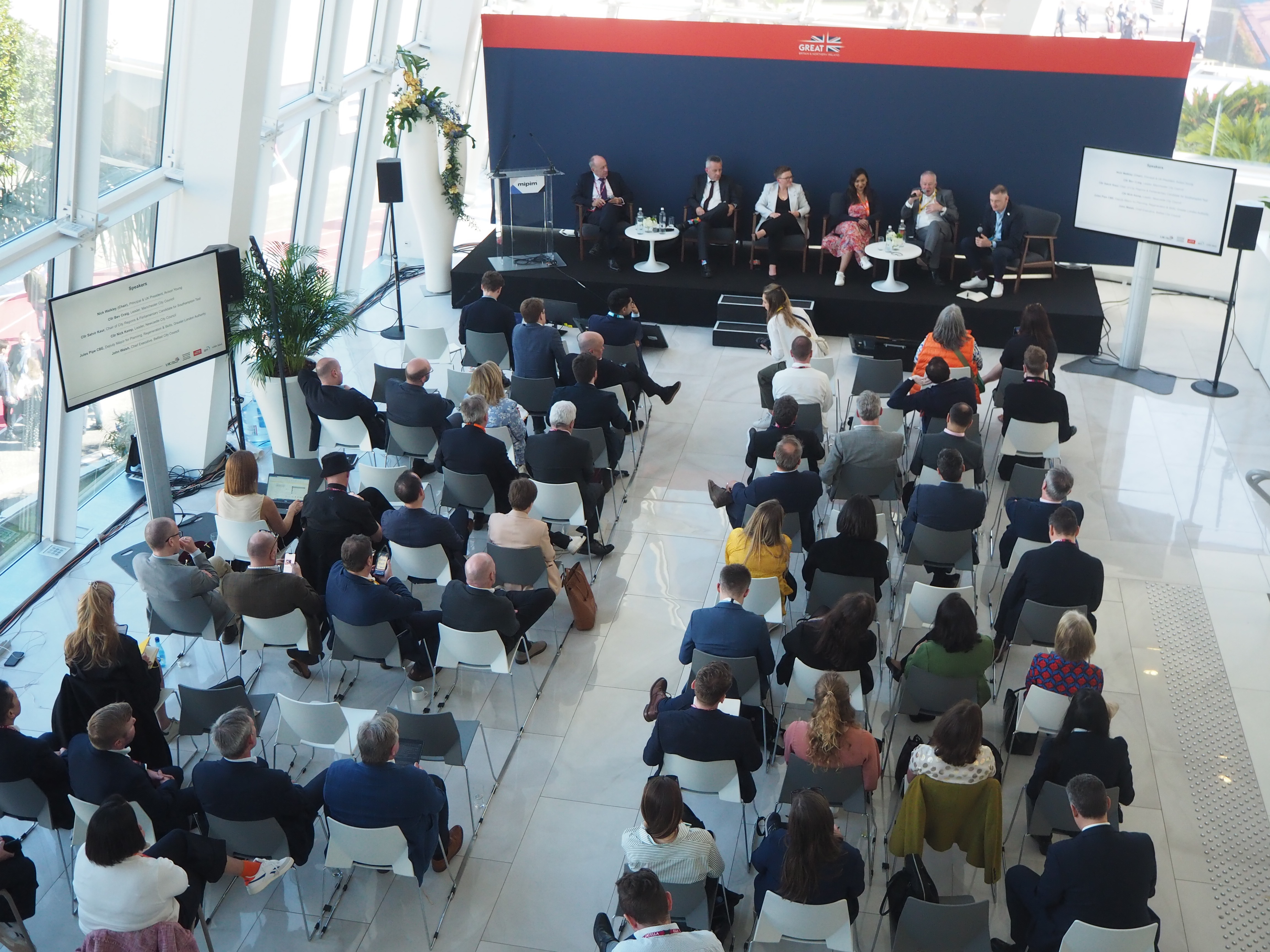
On the UK stage at MIPIM, Bev Craig Leader of Manchester City Council joined "A collective approach to attract large scale investment partnerships" a session which showcased major capital propositions in leading UK cities to demonstrate the strengths of the market to international investors. Bev Craig was joined by representatives from Southampton, Newcastle, London, Belfast and Avison Young.
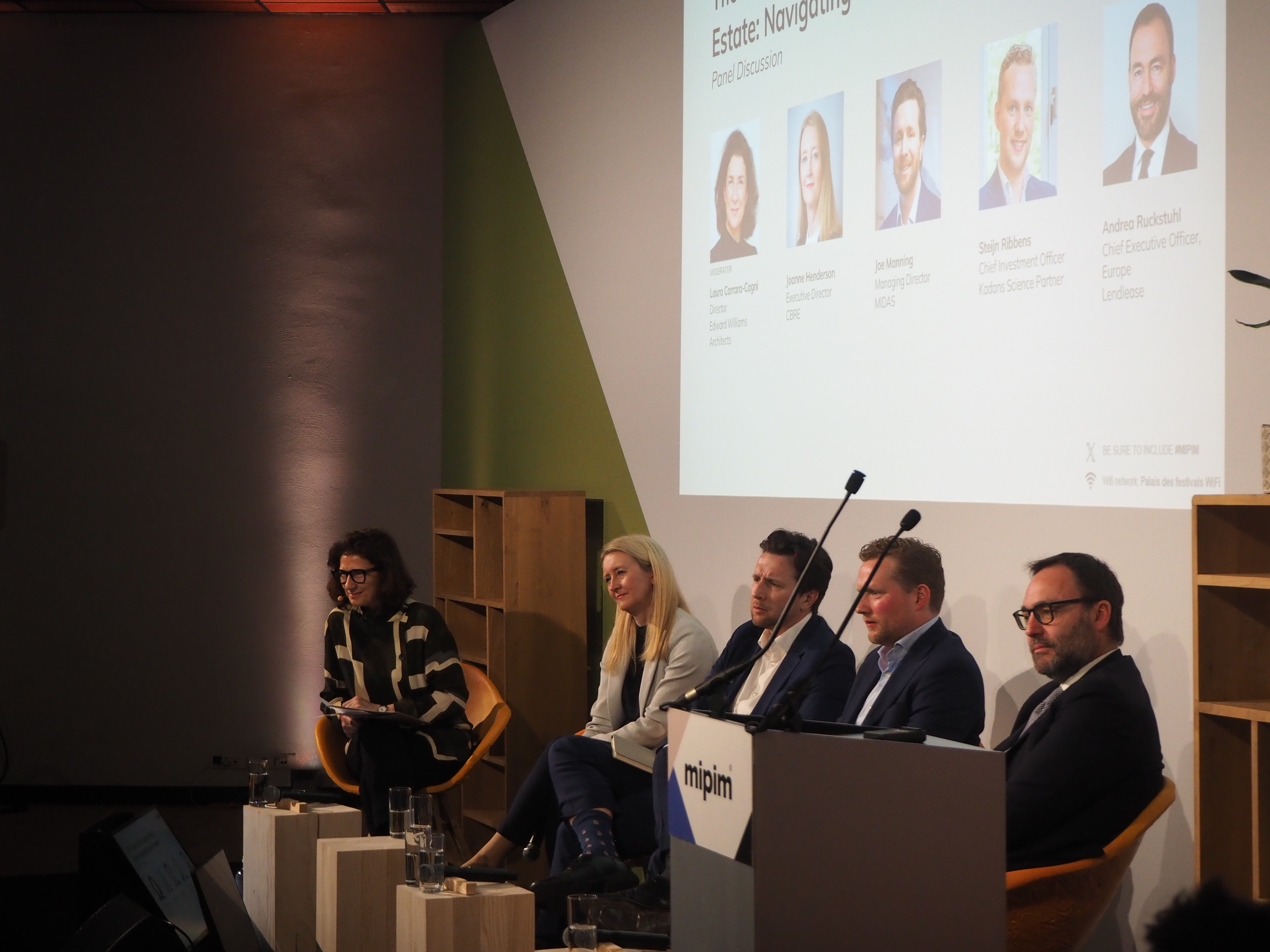
Meanwhile on the Asset Class Stage, Joe Manning Managing Director of MIDAS joined “The Future of Life Sciences Real Estate: Navigating New Frontiers”. As the life sciences sector is growing, and cities like Manchester are investing more in innovation assets to complement this growth, the session shared insights on opportunities for investment and growth in the field, the complexities of partnerships, funding and sustainability in the sector as well as the trends shaping the future of life sciences.
Joe was joined by representatives from Lendlease, Edward Williams Architects, CBRE and Kadans Science Partner.
Then after a short break in the programme to allow for pre-booked meetings with the delegates, we kicked off the afternoon with a session hosted by Civic Engineers and moderated by Chief Executive, Stephen O’Malley called “Greener Manchester – As the City Becomes a Pioneer for Urban Greening, What Value Stands to be Unlocked?”.
Joining Stephen to discuss how Manchester can build on its already successful green infrastructure to bring more benefits to the city and boost the regional economy was Kat Hanna, Co-Managing Director, London at Avison Young, Muyiwa Oki, President of RIBA, Caroline Simpson Chief Executive of Stockport Council and David West Lead Designer of Mayfield Park.
The panel discussed transformative projects like Mayfield Park and Ancoats Green that are bringing much-needed green space to the region as well as new nature-based solutions in the region’s office buildings and building stock.
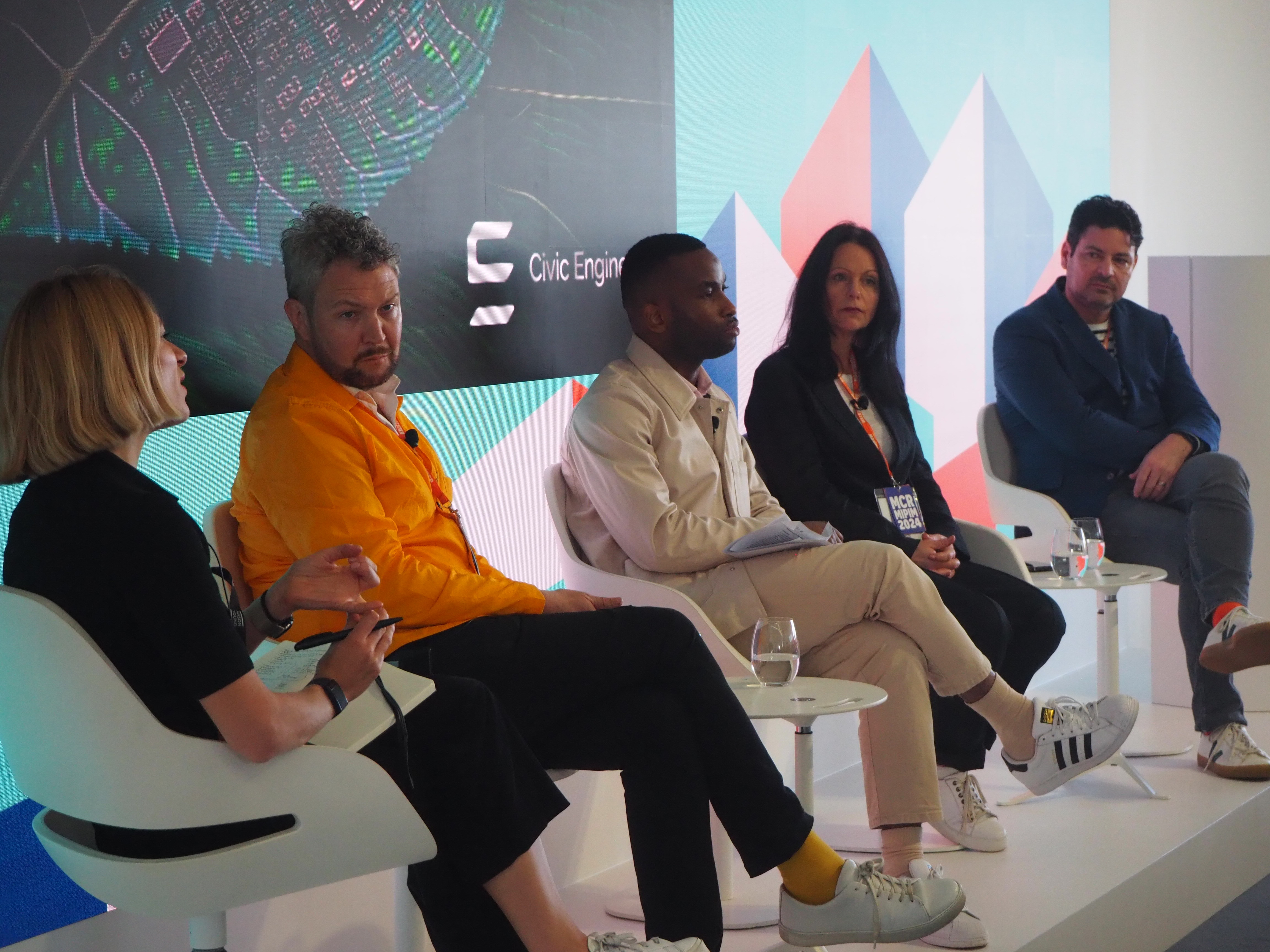
Kat Hanna said “We know places are resilient both economically and socially and in terms of climate. When they have that mix of uses, we’ve all seen it is very important. This isn’t just about reimagining city centres but suburban areas as well as green space has a really important role to play in the future of living.
"We know that developing at high density is better in terms of sustainability but there's often quite a negative character of what this would look like. Having that green infrastructure in place makes dense living more appealing.”
Muyiwa Oki said “The best places and best spaces are just a backdrop to people’s lives, people can inhabit it in any way they wish to. I want to be cautious about this idea of over programming spaces as iit cna make people feel isolated.
"Big infrastructure is important but those ad hoc informal proposals in city can make sure that everyone can benefit from the natural environment.”
Caroline Simpson said “On Monday we are launching and opening our new 2-acre Park right in the heart of Stockport Town centre which just happens to be on top of our new zero emission bus station. What that project has become is a massive flagship for how much the community in Stockport is valued in terms of our regeneration.
"As much thought has gone into community engagement, activation of the park and long-term maintenance as long as the park.
"It is absolutely beholden in councils to have a longer-term view. There’s an absolute logic as to why we would invest our whole approach in local government towards regeneration."
David West said “For green and blue architecture to be bigger, bolder , better we have to look at other colours of the rainbow. If we are to transform the corridors of Manchester, I think a more holistic view with all the colours of the rainbow is important.
"The more blue-green infrastructure we create, and the more it's interconnected the better. But I think you should take a more extraordinary approach to how you maintain them and make it a city-wide agenda"
Then it was time for ‘Curating the City for Growth – The Upper Brook Street Story.” This panel focused on the £450m Upper Brook Street life sciences campus and the strategic regeneration frameworks that made its development a success. It focused on the power of collaboration between multiple public and private sector partners to create the districts and places that the city needs to grow and that will serve communities for decades to come.
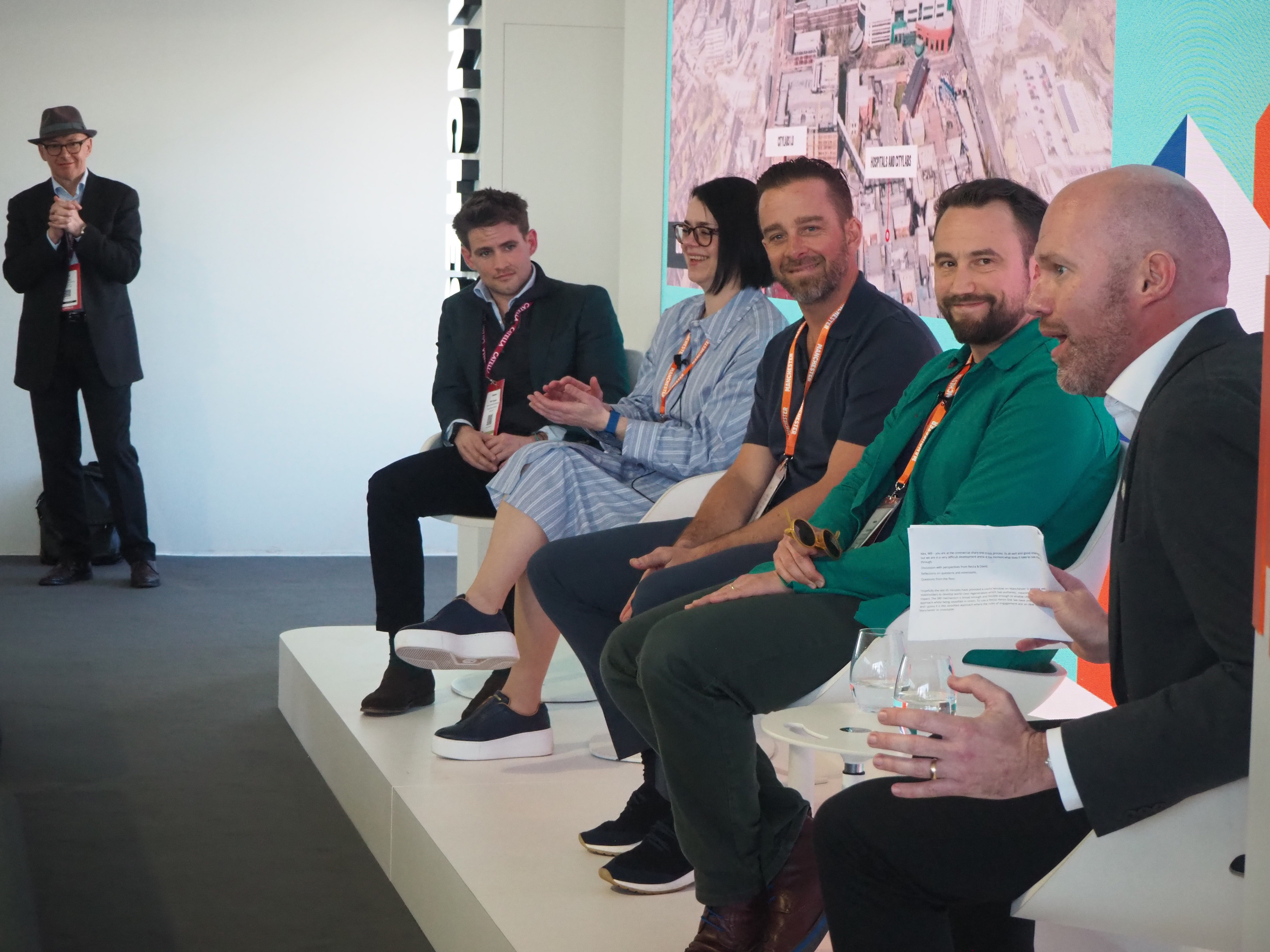
The panel was chaired by Chris Cheap, Principal Managing Director of Transactions at Avison Young and featured Will Fogden Senior Development Manager at Kadans, Rebecca Heron Strategic Director of Growth and Development at Manchester City Council, Alex Russell Chief Executive of Property Alliance Group and David Sparks Head of Manchester Studio at EPR Architects.
Will Fogden said “Wrongly for a long period of time, Manchester was looked at as a secondary city for science. But you have connections with the universities, with Salford and many businesses.”
Rebecca Heron said "A Strategic Regeneration Framework gives developers and investors clarity about what we're seeking, it guides discussions very easily and allows us to align partners behind those things. We use them across the city and they serve us well.
"It’s that collective vision that’s set out in the framework that protects the integrity of this area as Manchester’s innovation ecosystem
"For me, the way the partners have collaborated on this itinerary with the framework has been brilliant. The site is coming forward as a whole, it hangs together and delivers the council's objectives. Manchester has that growing reputation as a city of innovation with some real key sector strengths and it feels that we're really growing now and we’ve hit that catalyst moment."
Alex Russell said “It’s a life science led development and any other uses will be there to help facilitate life sciences development.
I’ve been at all of the stakeholder and community engagement so we’re able to say were here and we're not just going to come in and build those buildings and ride off into the sunset, if you’re not happy tell me about it. We need to make sure we’re delivering what the community want."
David Sparks said “We get to design buildings that are the next generation of space within Greater Manchester for the next generation. The idea of having a collective responsibility across the framework, it's about the place, each area of the city has a personality of their own.
"Something I enjoyed about the clarity of the process is that it allowed for a diversity in architectural process. This means we could reinvigorate different parts of the city centre and create our own stories.
"It’s not just the buildings or the architecture it’s the space in between and how it all knits together, that’s one of the strengths of the SRF process and bringing the community in as well.”
The final session of the day on the Manchester Stand was hosted by media partner Place North West and focused on the future of Wigan. “Greater Manchester’s £5bn Borough” was moderated by Deputy Editor of Place North West, Dan Whelan and discussed Wigan’s investment opportunities and its pivotal role in the future of Greater Manchester. Crucially, the session launched The Wigan Growth Location Plan which outlined hotspots for investment in the borough.

The Place North West Panel featured Harinder Dhaliwal Managing Director of Step Places, John Heaton Managing Director of Heaton Group, Sandra Robinson Technical Director of Strategic Growth at WSP, Warren Taylor Director of Cityheart and Mel Wilson Director at Deloitte.
To view the programme for Thursday at MIPIM, click here.
To follow live updates, make sure you’re following @mcrMIPIM on Twitter and catch our live stream here.
Take a look at some more of the highlights from Day Two at MIPIM below: